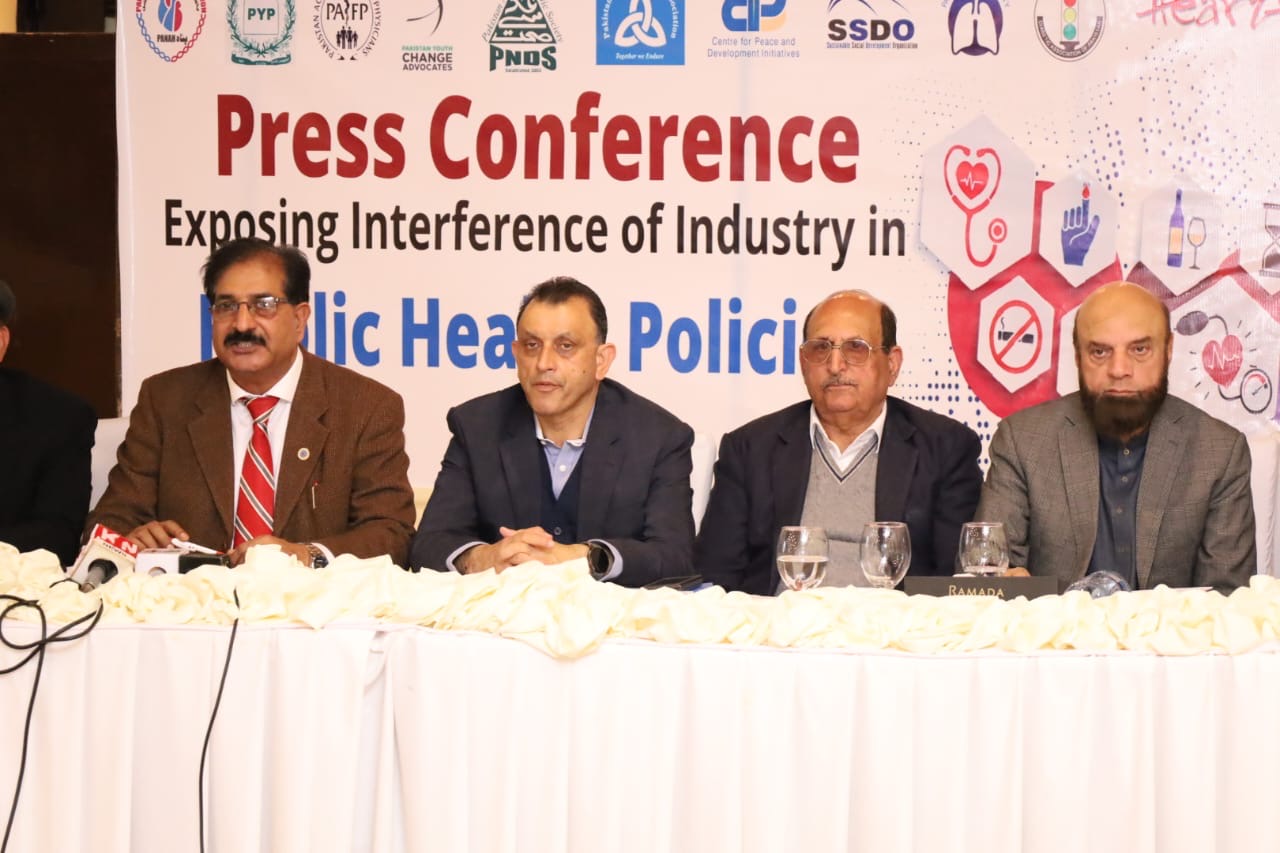 21 February 2025,Islamabad( Ghufran):Civil society organizations, academia and medical associations have called for urgent government action to eliminate the undue influence of the food and beverage industry in public health and nutrition policymaking. Expressing deep concern over the increasing involvement of industry and their front groups in influencing public health and nutrition policies, activists highlighted the serious conflict of interest that arises when such companies participate in child nutrition initiatives and government decision-making processes.
21 February 2025,Islamabad( Ghufran):Civil society organizations, academia and medical associations have called for urgent government action to eliminate the undue influence of the food and beverage industry in public health and nutrition policymaking. Expressing deep concern over the increasing involvement of industry and their front groups in influencing public health and nutrition policies, activists highlighted the serious conflict of interest that arises when such companies participate in child nutrition initiatives and government decision-making processes.
Despite substantial evidence on the harmful health effects of ultra-processed products and sugary beverages, these corporations continue to expand their influence in policy making in Pakistan. Nestlé Pakistan has recently engaged with key government institutions, including the Pakistan Standards and Quality Control Authority (PSQCA), provincial food authorities, FBR, Senate of Pakistan, Ministry of Industries, National Tariff Commission and the Special Investment Facilitation Council. Given that these agencies are responsible for developing policies in the public interest including for food, nutrition, and public health, Nestlé’s involvement raises significant concerns about transparency and potential undue influence over public health decision-making.
In another concerning development, Coca-Cola in collaboration with a food authority at Punjab has distributed branded lunch boxes in schools—an apparent strategy to maintain its presence among children despite restrictions on sales and marketing of unhealthy products to school learners. The involvement of such companies in child nutrition initiatives represents a clear conflict of interest, posing risks that may allow beverage corporations to influence public health policies in their favor. Similarly, the Punjab Nutrition Board has included Nestlé and Friesland Campina in its decision-making process, while at the federal level, a policy board has been established under the Planning Commission that includes food industry representatives. These incidents drive serious concern among health professionals and civil society representatives.
The rising consumption of ultra-processed products is contributing to a nationwide health crisis, leading to increasing cases of obesity, diabetes, heart, kidney and other diet-related chronic diseases. To counter this growing epidemic, civil society organizations and health professionals demand the implementation of robust policy measures, including higher taxes on ultra-processed food and beverage products, enactment of mandatory front of pack warning labels on processed products, elimination of industrially procured tranfats from the food supply and introduction of strong conflict of interest policies to safeguard public health.
These demands were emphasized in a joint press conference organized by the Pakistan National Heart Association (PANAH) and its coalition partners. Organizations represented at the event included PANAH, Heart File, Pakistan Youth Change Advocates (PYCA), Center for Peace and Development Initiatives (CPDI), Pakistan Diabetes Association (DAP), Pakistan Nutrition and Dietetic Society (PNDS), Pakistan Kidney Patients Welfare Association (PKPWA), Pakistan Medical Association (PMA), Pakistan Academy of Family Physicians (PAFP), Pakistan Pediatric Association, Youth Parliament Pakistan, Meri Pechan Pakistan, Pakistan Chest Society,
The Cancer Foundation, Agha Khan University, Nutrition Foundation of Pakistan, and others along with health professionals, media representatives, and civil society members.
Mr. Sanaullah Ghumman, General Secretary of PANAH, highlighted the contradiction in public health policies, noting that the Punjab Food Authority has already issued a regulation in 2017 to restrict the sale and marketing of beverages in schools and within a 100-meter radius. He criticized the recent Memorandum of Understanding (MoU) signed with Coca-Cola, which allows the beverage company to distribute food boxes featuring its branding, calling it a direct violation of conflict-of-interest principles and a serious threat to children’s health.
Other speakers at the press conference stressed the need for immediate action to curb the rising burden of non-communicable diseases (NCDs) in Pakistan. They emphasized the necessity of a transparent policy-making process free from corporate influence, ensuring that individuals or entities with vested interests do not have a role in influencing public health and nutrition policies. Civil society leaders called on the government to prioritize public health in decision-making and to revoke any policies that compromise the well-being of the people.